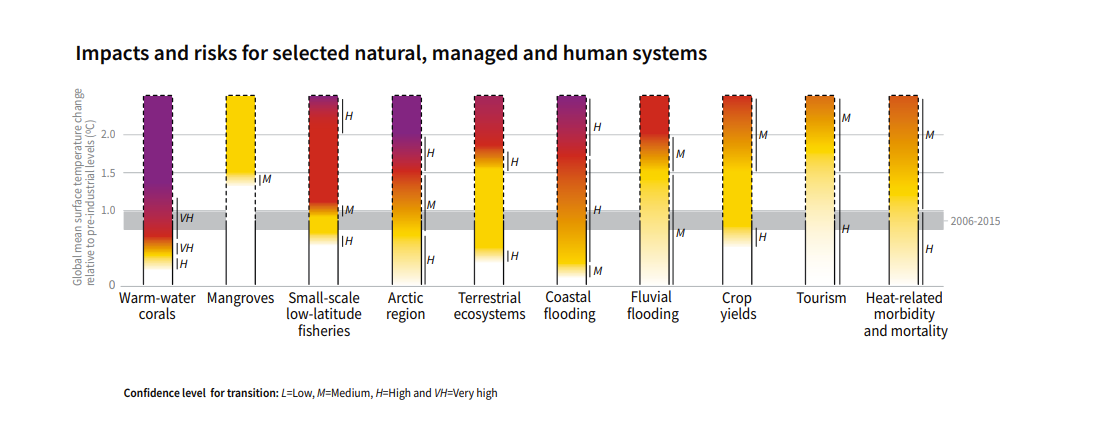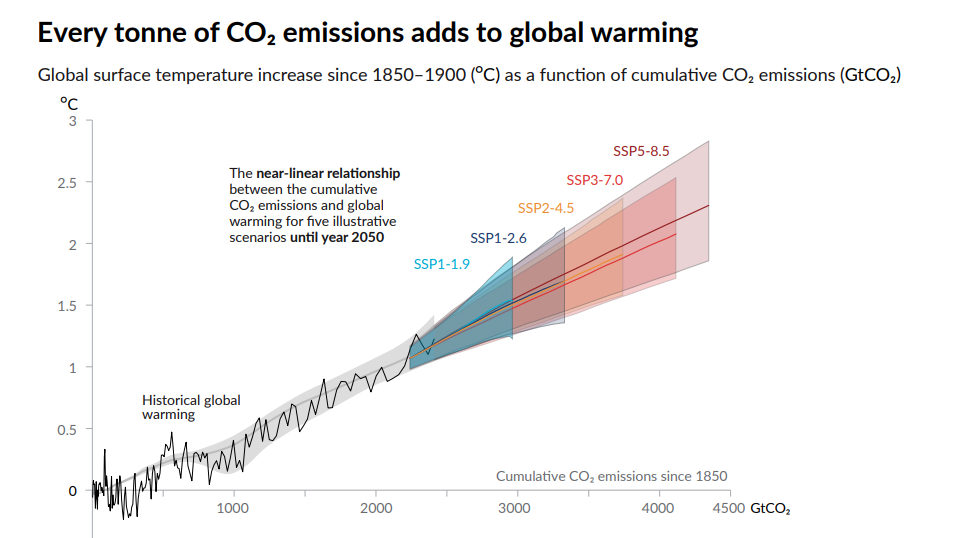Key takeaways
- Recent climate data should serve as a wake-up call. We have crossed a significant threshold with respect to social, environmental, and economic impacts
- Things will likely get much worse after a 1.5°C rise in average global temperatures, due in part to the reinforcing nature of tipping points
- Quantifying climate change (e.g., increase in average temperature) involves uncertainty, some of which can only be eliminated retrospectively
- 1.5°C targets are still crucial to providing a clear direction and pace to mitigate the worst scenarios of global temperature rise
The recent announcement by the Copernicus Climate Change Service regarding the average global temperature rise above preindustrial levels over the 12-month period from February 2023 to January 2024 has sparked discussions on the state of the climate and the meaning of temperature-aligned climate targets. Many GRESB participants look to “1.5°C-aligned pathways” (e.g. CRREM) for understanding the pace of required change and managing transition risk. Does passing the 1.5°C ‘barrier’ change the relevance, utility, or even reliability of such targets and pathways? Below, we dive into the science of why 1.5°C is still important.
Assessing climate trends beyond single-year measurements
Firstly, it’s crucial not to equate climate with the average or median temperature of any single 12-month period.
‘Climate’ refers to the average weather in terms of the mean and its variability over a certain timespan and a certain area. Climate varies also in time; from season to season, year to year, decade to decade or on much longer timescales, such as the ice ages. Statistically significant variations of the mean state of the climate or of its variability, typically persisting for decades or longer, are referred to as ‘climate change.’ (IPCC)
Yet, the alarming fact remains that 2023 marked the hottest year on record. If this trajectory continues, 2024 could serve as a critical juncture, potentially representing a midpoint in a 20-year average of 1.5°C temperature rise. Without significant reductions in emissions, there is a risk of accelerating temperature rise, underscoring the urgency of climate action.
Tipping points and their implications
Tipping points in the climate system present a complex challenge for accurate modelling due to their reliance on numerous interconnected factors and subsystems. Compounding this difficulty is the fact that not all tipping points are known or fully understood. Once a tipping point is crossed, the consequences can be irreversible in the short-to-medium term, with reinforcing feedback dynamics exacerbating and accelerating climate change. Despite the uncertainties surrounding tipping points, scenarios outlined by the Intergovernmental Panel on Climate Change (IPCC) in its most recent Assessment Report, AR6, suggest that surpassing the 1.5°C threshold is probable, necessitating immediate and robust action. In fact, prominent institutions around the world that maintain global climate datasets have shown we may have already crossed the threshold this year or are very close to doing so [Berkeley Earth, Copernicus (EU), NOAA, UK Met Office, WMO].

Figure 1. The IPCC has provided a now classic illustration of the increasing severity of impacts with rising temperatures (Source: IPCC Summary for Policy Makers).
Revisiting 1.5°C targets: Practicality and importance
While the IPCC’s report underscores the adverse consequences of exceeding 1.5°C of warming, it also highlights the benefits of every fraction of a degree of warming avoided. Thus, the 1.5°C target should be viewed not as a rigid threshold but as a practical goal for countries and corporations alike. Even if targets are missed by slight margins, the collective efforts towards mitigating climate change should be celebrated. Moreover, striving for 1.5°C targets within a 2°C world is not only commendable but also strategically wise, as it enhances resilience to future low-carbon policies and economic shifts. Failure to adhere to 1.5°C targets could leave entities vulnerable to the increasingly stringent regulations and economic landscapes associated with higher levels of warming.
Embracing uncertainty: The necessity of ambitious targets

Figure 2. IPCC analysis shows that every incremental tonne of GHG emissions contributes to warming and impacts (Source: IPCC Working Group 1 Summary for Policy Makers).
While targets enshrouded in complex models, uncertainty, and challenges are not the most reassuring to fully commit to, such targets are often the most vital. In the fight against climate change, we should wholeheartedly embrace these targets, as failing to do so could leave us with nothing left to safeguard ourselves. While not always perfectly accurate, these targets serve as crucial guideposts for action and policy formulation.
The recent climate data should serve as a wake-up call, emphasizing the imperative of urgent and concerted efforts to mitigate the escalating impacts of climate change. Recent data also emphasizes the need for increased efforts regarding adaptation. However, it should not be forgotten that when it comes to large non-linear systems such as the climate, the phrase “a penny’s worth of prevention is worth a pound of cure” cannot be overstated. Thus, in alignment with principle 4 of the “10 Principles for Effective Action” from the Global Alliance for Buildings and Construction – “implement adaptation and mitigation in tandem” – increased focus on adaptation must not come at the cost of mitigation.
In conclusion, the need for ambitious climate action has never been more pressing. One of the first mission-critical steps in any credible decarbonization plan is to take a complete inventory of your organization’s emissions, or if you are a financial institution, your financed emissions. The GRESB Carbon Footprint Dashboard provides this capability for investors with global real estate portfolios, offering a comprehensive tool for monitoring emissions data effectively.
So, are 1.5°C targets still relevant? Yes, because every tonne of emissions matters, and 1.5°C-aligned metrics provide a consistent global point of comparison.
References
ADEME, Resallience, French Ministry of Ecological Transition. “Adaptation of the building sector to climate change: 10 principles for effective action.” Report, Nairobi, 2022.
Baede, A. P. M., Ahlonsou, E., Ding, Y., & Schimel, D. S. (2001). The climate system: an overview. In J. J. Maccarthy, O. F. Canziani, & N. A. Leary (Eds.), Climate Change 2001: The Scientific Basis (pp. 87-98). New York: Cambridge University Press.
Dewan, Angela. “The world just marked a year above a critical climate limit scientists have warned about.” CNN (London UK), Feb. 8, 2024.
IPCC, 2018: Summary for Policymakers. In: Global Warming of 1.5°C. An IPCC Special Report on the impacts of global warming of 1.5°C above pre-industrial levels and related global greenhouse gas emission pathways, in the context of strengthening the global response to the threat of climate change, sustainable development, and efforts to eradicate poverty [Masson-Delmotte, V., P. Zhai, H.-O. Pörtner, D. Roberts, J. Skea, P.R. Shukla, A. Pirani, W. Moufouma-Okia, C. Péan, R. Pidcock, S. Connors, J.B.R. Matthews, Y. Chen, X. Zhou, M.I. Gomis, E. Lonnoy, T. Maycock, M. Tignor, and T. Waterfield (eds.)]. Cambridge University Press, Cambridge, UK and New York, NY, USA, pp. 3-24.
IPCC, 2021: Summary for Policymakers. In: Climate Change 2021: The Physical Science Basis. Contribution of Working Group I to the Sixth Assessment Report of the Intergovernmental Panel on Climate Change [Masson-Delmotte, V., P. Zhai, A. Pirani, S.L. Connors, C. Péan, S. Berger, N. Caud, Y. Chen, L. Goldfarb, M.I. Gomis, M. Huang, K. Leitzell, E. Lonnoy, J.B.R. Matthews, T.K. Maycock, T. Waterfield, O. Yelekçi, R. Yu, and B. Zhou (eds.)]. Cambridge University Press, Cambridge, United Kingdom and New York, NY, USA, pp. 3−32.
IPCC, 2023: Summary for Policymakers. In: Climate Change 2023: Synthesis Report. Contribution of Working Groups I, II and III to the Sixth Assessment Report of the Intergovernmental Panel on Climate Change [Core Writing Team, H. Lee and J. Romero (eds.)]. IPCC, Geneva, Switzerland, pp. 1-34.
